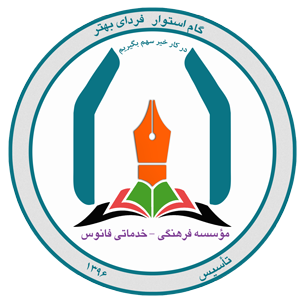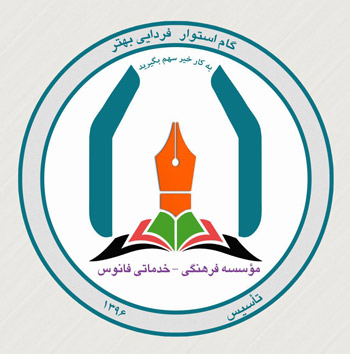The Statute of Fanos Cultural and Service Organization (FCSO)
Introduction
Afghanistan is a country that has presented great personalities to the world. With having a bright history, this land has raised many grand and unique scholars such as Maulana Jalaluddin Balkhi, Khaje Abdullah Ansari, Abu Rihan Beroni, Bu-Ali Sina, Rabia Balkhi, Naser Khosraw Ghobadiyan Balkhi, Abu al-Majid Hakim Sanai Ghaznavi, and hundreds others who gained global fame. Unfortunately, the geographic location of Afghanistan has caused to be invaded by superpowers. The several decades of war and destruction have made Afghanistan lose its past glory. The war-related problems are still ongoing in this country
.
The people of Afghanistan have always lived with hope and enjoyed gracious cooperation offered by compassionate and philanthropic friends; contributing in fighting against poverty and illiteracy, they made the people become more hopeful about their future. FCSO has been established with its specific slogan (firm steps towards better tomorrow) while being free from ethnic, linguistic, and religious discrimination aims to present a bright future for its people sand become a successful example for others. Within the framework of national law, full honesty and firm determination it will proceed to strive towards providing high quality services and cultural promotions.
Affairs Chapter One: General
Article 1:
This statute is codified in accordance with the provisions of national constitution article 35 and Law of Population of the Islamic Republic of Afghanistan.
Article 2:
Name: the name of this entity is Fanus Cultural and Service Organization and hereafter referred to as “Organization ” and its abbreviation in English is FCSO; it is a non-governmental, nonprofit and non-political entity that comply its activities according to the NGO law and rest of ruling laws of the country.
Article 3:
The central office of the Organization is in Kabul with a specific logo and symbol. The motto of the Organization is a “firm step towards better tomorrow”.
Note:
The Organization can establish branches or agencies inside and outside the country if it is required.
Article 4:
The formal activity of this Organization will officially commence after formal approval of the Evaluation High Commission for Registration and license issuance.
Article 5:
Given the contents of this statute, the Organization will provide humanitarian services and fight for elimination of deprivation with serious commitment to be free from all forms discriminations.
Article 6:
The Organization has a formal and independent legal personality and it’s cultural and service activities are operated under supervision of the founder.
Article 7:
In accordance with the of law of population of the Islamic Republic of Afghanistan and other laws of the country, the Organization’s budget will be provided from the income of the Organization, donations of benevolent individuals, donors, internal or external charity organizations or other resources.
Chapter Two: Goals
Article 8: Goals and Duties of the Organization
To provide cultural, social, health or other public services in disadvantaged areas of the country.
Chapter Three: Structure
Article 9:
The Organization has the following structure:
1 Founder
2 chairman
3 Boards of Trustees
Article 10: The founder is Abdul Azim (Ahmadi) that has the following duties:
- Review and adoption of short term and long term policies and guidelines for the Organization and obtaining necessary work permit from the relevant authorities in coordination and cooperation of the chairman and members of board of trustees.
- Selection the member of Board of Trustees in consultation with the elite
- Making efforts to absorb fiscal resources and space to start the Organization’s programs
- All contracts and documents of the Organization will be signed by the founder or his authorized representative when it is required outside of the country.
Article 11: chairmanship
- The chairman of the Organization shall be elected by the founder in consultation with the members of the trustees’ board.
Note: The chairman can appoint a person as his assistant.
- The general management of Organization will be carried out in accordance with statutes but the internal regulations will be prepared by the chairman.
- The responsibility of chairman is to lead the general programs of the Organization and monitor its activities.
- In consultation with the members of the board of trustees, the chairman may propose development, suspension of the activities or its dissolution to the founder.
- Within the boundary of country, all contracts and formal documents of the Organization shall be signed by the chairman after the approval of the Board of Trustees.
Note: If the chairman travels abroad in connection with the work of the Organization, he / she can sign the contracts himself.
- Signature of all documents related to executive members, head of branches and other affiliated center will be done by the chairman.
- The chairman is elected by the founder and board of trustees for four years.
Note: in accordance with the statute of Organization, the chairman must make his best efforts for advancement of Organization; In case of raising any issues including indifferences or inability towards Organization’s affairs, the board of trustees may suggest the founder to dismiss the chairman.
- The human resources will be recruited by the chairman of Organization.
- The chairman can delegate some of his authorities to his assistant if necessary.
- Recruitment and dismissal of the personnel, in accordance with statute, is the job of chairman.
- Supervision and protection from properties of the Organization is the responsibility of the chairman.
- Article 12: the Board of Trustees
The Board of Trustees consists of nine prominent and qualified personalities proposed by the chairman of the Organization and approved by the founder for four years with the following duties and authorities:
- Monitoring the performance of Organization and its affiliated centers.
- Assess the needs of the area in line with activities and objectives of the Organization and provide appropriate plans for them to be approved.
- Seeking ways of developing programs and searching new sources for funding the Organization.
Note: the in charge of Board of Trustees is elected through its members and he would be responsible for conducting the board’s meetings.
- Approve the salary scale and advantages of personnel.
- Approve the internal rule and regulation of the Organization.
- Endorse the new recruited personnel when they are proposed by the vice chairman.
Chapter Four: Miscellaneous Clauses
Article: 13
In case of any problems for key members of the Organization, the Board of Trustees will convene an extraordinary meeting and decide.
Article: 14
All meetings will be held in accordance with the internal rules and principles; the legitimacy of meeting decisions will be confirmed by attendance of 50 plus one, and the majority vote will approve the decision of meetings.
Article: 15 Executive Boards
The Executive Boards of Organization consist of Chairman, vice chairman, Administrative and Financial Officers.
Article: 16
With proposal of the majority of the key members of the Organization (founder, chairpersons and member of trustee board) this statute may be revised or update according to the demand of time.
Article: 17
In the absence of the chairman, the vice chairman has all the authority of the chairman.
Article: 18
All the movable and immovable property of the Organization belongs to the Organization and it is registered under its name, and none of the members has the right to own the property and neither has the right to register the properties under their own names.
Article: 19
The entire allocated budget is spent in accordance with the goal of Organization and contract terms. Based on this, its annual financial reports must be submitted to the relevant authorities.
Article: 20
In the case of dissolution, merger and termination of activities the property of Organization, in accordance with the decision of the relevant authority and NGO law, will be given to similar-purpose organizations or to the Government of Islamic Republic of Afghanistan.
Article: 21
No one has the right to sell the Organization’s properties and distribute its price among the members.
Article: 22
All equipments and facilities of Organizations should be purchased with bill and invoice.
Article: 23
The annual financial report of the Organization is submitted to the relevant authorities and one copy is stored in the archive of the Organization.
Article: 24
All members of the Organization are obliged to respect all the articles and contents of this statute and, thus the internal regulations.
Article: 25
This statute has been approved in four chapters, twenty five articles and 3 notes.
The End
.

